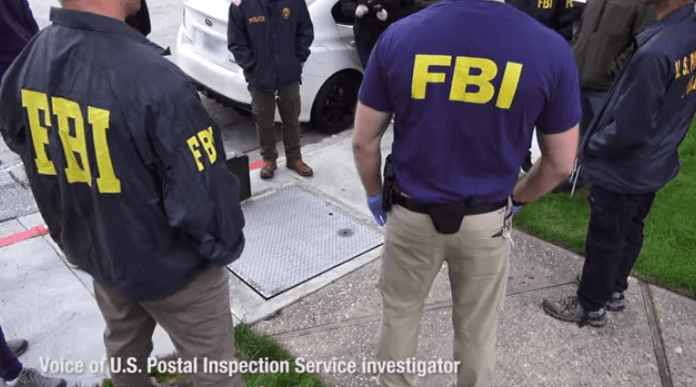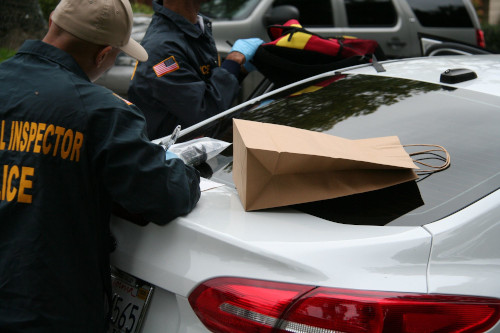DEA: 61 Arrested in Darkweb Opiate Operation
Federal law enforcement agencies announced the arrest of 61 suspects in an operation targeting darkweb drug trafficking organizations. In addition to the 61 suspected vendors, law enforcement agencies identified and spoke with more than 100 darkweb drug buyers.
Operation SaboTor
WASHINGTON – Today, members of the Joint Criminal Opioid and Darknet Enforcement team announce the results of Operation SaboTor, a coordinated international effort targeting drug trafficking organizations operating on the Darknet. This is J-CODE’s second coordinated action and follows the success of last year’s Operation Disarray.
As a result of Operation SaboTor, U.S. and international law enforcement agencies made 61 arrests and shut down 50 Darknet accounts used for illegal activity. Law enforcement executed 65 search warrants, seizing 299.5 kilograms of drugs, 51 firearms, and more than $7 million ($4.5 million in cryptocurrency, $2.48 million in cash, and $40,000 in gold). They also conducted 122 interviews. In addition, participating agencies engaged in public education efforts regarding the dangers of opioid abuse during the operation.
FBI and USPIS during Darkweb Investigation
Operation SaboTor was conducted between Jan. 11 and March 12, 2019, and was composed of a series of separate but complementary joint operations, all aimed at making a global impact on the opioid epidemic. The operation was a collaborative effort across the J-CODE entities, including the Drug Enforcement Administration, Federal Bureau of Investigation, U.S. Immigration and Customs Enforcement Homeland Security Investigations, U.S. Customs and Border Protection, United States Postal Inspection Service, Department of Justice and Department of Defense, with participation from international partners during the Cyber Patrol Action Week at Europol. By leveraging partnerships and surging resources across the U.S. Government and Europol, Operation SaboTor was used to detect and disrupt the most prolific opioid vendors on the Darknet and dismantle the criminal enterprises facilitating their opioid trafficking.
DEA:
“This successful operation sends a strong message that DEA, together with our law enforcement partners, will disrupt, dismantle and destroy drug trafficking organizations that bring poison into our communities,” said DEA Acting Administrator Uttam Dhillon. “DEA’s greatest tool is our relationship with our federal, state, local and international law enforcement partners who stand with us every day to fight this epidemic. Drug traffickers will be held accountable for the pain and death they cause, regardless of what technology they use.”
FBI:
“Law enforcement is most effective when we work together, and J-CODE is the global tip of the spear in the fight against online opioid trafficking,” said FBI Director Christopher Wray. “Criminals have always adopted innovations and new technologies to achieve their illicit goals, and it’s our job to adapt and remain ahead of the threat. Operation SaboTor demonstrates not only the strength of our partnerships across the U.S. Government and abroad, but how we’re able to capitalize on those partnerships to disrupt criminal activity, even when they try to hide it on the Darknet.”
ICE-HSI:
“Homeland Security Investigations, together with its law enforcement partners, has proven, once again, the selling of illicit items on the Darknet will not be tolerated in the United States,” said Executive Associate Director Derek Benner, U.S. Immigration and Customs Enforcement. “Operation SaboTor sends a clear message to criminals that no matter how or where crimes are committed, nothing is beyond the reach of the law. We will use every possible means to find them, take apart their organizations, and leave them with nothing.”
USPIS:
“Postal inspectors and our law enforcement partners are using tried and true investigative techniques combined with the latest cutting-edge technology to identify those responsible for opioid trafficking and bring them to justice,” said Chief Postal Inspector Gary Barksdale. “Operation SaboTor is a major step forward in the journey to combat the opioid epidemic and protect our citizens from dangerous drugs. The U.S. Postal Inspection Service will continue to work tirelessly alongside our J-CODE partners to keep our communities safe.”
Europol:
“The Darkweb is not as dark as you think. When you buy or sell illegal goods online, you are not hidden from law enforcement and you are putting yourself in danger,” said Europol Executive Director Catherine De Bolle. “This international coordinated approach demonstrates law enforcement’s determination to tackle crime on the Darkweb and to reduce the number of people who fall victim to criminals selling life-endangering products or scamming them for their own gain.”
The investigations leading to Operation SaboTor included support and resources from the DEA; FBI; HSI; CBP; USPIS; DOD; DOJ’s Computer Crime and Intellectual Property Section, Narcotic and Dangerous Drug Section, Organized Crime and Gang Section and Special Operations Division; and Europol and their Cyber Patrol team.
Operation SaboTor: The Story
When Knoxville first responders found a man dead in his home, there was clear evidence on the scene of the heroin that caused his overdose. Also nearby were clues to how the deadly drugs had reached him. Investigators found a padded manila envelope with postage and markings that provided them another link back to the online drug sellers who have proliferated on the Darknet in recent years.
Drug traffickers are increasingly using anonymous online networks to sell narcotics, including potent synthetic opioids like fentanyl, to buyers who can order and receive the drugs without ever leaving home. What can appear to be a regular e-commerce transaction is one of the delivery channels fueling a deadly nationwide epidemic. The Centers for Disease Control and Prevention reports that drug overdose deaths have been on an upward climb for several years, across the United States and across all demographic groups. In 2017 alone, 70,237 people in this country died of a drug overdose; two-thirds of those deaths involved an opioid.
As part of a government-wide effort to address the epidemic, the Department of Justice created the Joint Criminal Opioid and Darknet Enforcement (J-CODE) team in 2018 to leverage the power of federal and international partnerships to combat the complex and deadly threat of online drug sales.
Now in its second year, J-CODE is delivering results through coordinated efforts and the commitment of the nation’s law enforcement agencies to address opioid sales on the Darknet. Building on the success of last year’s Operation Disarray, the J-CODE team led Operation SaboTor between January and March of this year. These concentrated operations in the United States and abroad led to 61 arrests and shut down 50 Darknet accounts used for illegal activity. Agents executed 65 search warrants, seizing more than 299 kilograms of drugs, 51 firearms, and more than $7 million ($4.504 million in cryptocurrency, $2.485 million in cash, and $40,000 in gold).
“This is a new and evolving threat, and we found that no one agency can do it alone.”
Maggie Blanton, special agent, FBI Hi-Tech Organized Crime Unit
J-CODE joins the efforts of the FBI with the Drug Enforcement Administration (DEA), United States Postal Inspection Service (USPIS), U.S. Immigration and Customs Enforcement Homeland Security Investigations (HSI), U.S. Customs and Border Protection (CBP), Department of Justice (DOJ), and the Department of Defense (DOD). As many of these markets cross borders, Europol is also an invaluable international partner in J-CODE’s efforts to make a global impact on Darknet drug trafficking.
“This is a new and evolving threat, and we found that no one agency can do it alone,” said FBI Special Agent Maggie Blanton of the Hi-Tech Organized Crime Unit at FBI Headquarters. “The FBI may get information from local law enforcement after an overdose or arrest. Through that tip, we can work with our federal partners with the Postal Inspection Service, because so often the drugs are moving through the mail. Our Customs and Border Protection partners are a great resource on understanding trends and preventing drugs from coming into the country from abroad, and our partnership with DEA is critical because of their experience and expertise with drug cases.”
The evidence gathered from that overdose death in Knoxville, for example, was shared with local law enforcement and then with USPIS, the FBI, and other partners. The eight-month investigation led to the arrest of five suspects in the Los Angeles area in March 2019 who are believed to be behind at least two online drug sites that shipped out an estimated 1,500 parcels each month. Search warrants carried out on a residence rented by the suspects and two of their vehicles uncovered drugs, a loaded gun, mailing supplies, computers, cell phones, and transaction receipts.
FBI Special Agent Nathan Cocklin said members of his Hi-Tech Organized Crime squad from the Los Angeles Field Office, along with USPIS inspectors, interviewed the suspects as they were brought into custody. He said the suspects claimed they were just running a business, making money, and not considering the impact of their online sales. “It’s a transaction only,” Cocklin said of the Darknet marketplaces. “They don’t even know each other’s real names.” He said the suspects never considered that a package dropped in a mailbox in Southern California could mean the loss of a life in eastern Tennessee. Members of the J-CODE team conduct a search of a residence and vehicle in California in March 2019, where drugs were among the items seized.

Members of the J-CODE team conduct a search of a residence and vehicle in California in March 2019, where drugs were among the items seized.
A Multi-Agency, Multi-Layered Approach
The Darknet is a part of the Internet accessed through a specialized browser called Tor. Tor allows users to better hide who they are, where they are, and what they are doing online. Darknet marketplaces offer illicit goods that range from hacked bank accounts and stolen credit card information to guns and drugs.
“It’s become easier to get onto the Darknet marketplaces—all you need is a smartphone or computer,” said Chris Oksala, a supervisory special agent with DEA. “There are multiple ways to pay for the drug—from cryptocurrencies to Western Union transfers—and there are multiple ways to shield your identity.”
But on the other side of the seeming ease and anonymity of buying and selling on the Darknet is the hard work being done by law enforcement, in concert, to combat the illegal activity occurring online—from targeting the marketplaces and the sellers to reaching out to those buying illegal wares online.
“These are very complex and time-consuming cases for one agency,” said Kyle Rau, USPIS program manager for Darkweb investigations. “The ‘one government’ approach allows us to tap into each agency’s strength and allows each agency to focus on a particular task.”
The FBI and its law enforcement partners in the United States and abroad have had tremendous success in recent years taking down some of the largest and most profitable Darknet marketplaces. In 2017, law enforcement seized the AlphaBay marketplace, believed to be the largest Darknet market at the time. That seizure was followed by a takedown of Hansa market, another major player.
“It is harder to get the infrastructure up,” stressed Cocklin. “To compare it to a normal drug organization, a dealer is easier to replace than the head of the organization. If you take out a marketplace, you have to rebuild. It takes money and time and undermines trust. Did taking out AlphaBay and Hansa stop everything? No. Did it make an impact? Absolutely.”
The next-level target is the Darknet drug trafficking organizations. The goal of Operation Disarray and Operation SaboTor, along with the ongoing work of J-CODE partners, is to identify and arrest those behind the online sales.
“It takes work, but the FBI, USPIS, DEA, and others are laser-focused on tackling the opioid epidemic on the web.”
Nathan Cocklin, special agent, FBI Los Angeles
The final prong of the J-CODE effort is educating the public on the dangers of opioids by contacting individuals who are known to have purchased drugs online. Sometimes the message arrives too late. In locating and contacting buyers, the J-CODE team often comes across death notices and obituaries. In some cases, agents learn from buyers that they had survived an overdose; in other cases, agents learn from family members that a buyer did not. Oksala stressed that many of the drugs being sold online carry the added danger of unknown, powerful chemicals. “People are making thousands of pills at a time, doing the formulation without any scientific training,” he said.
The agents arrive with information on addiction and treatment, and their very presence challenges the anonymous nature of the Darknet. “If they know someone is looking, people lose faith in the marketplace,” said Rich Sheehan, USPIS assistant inspector in charge. “We’ve proven time and time again that they are not anonymous.”
”We are able to identify people,” said Cocklin. “It takes work, but the FBI, USPIS, DEA, and others are laser-focused on tackling the opioid epidemic on the web.”
Source: Operation SaboTor: Federal Partnerships Key to Dismantling Online Drug Markets